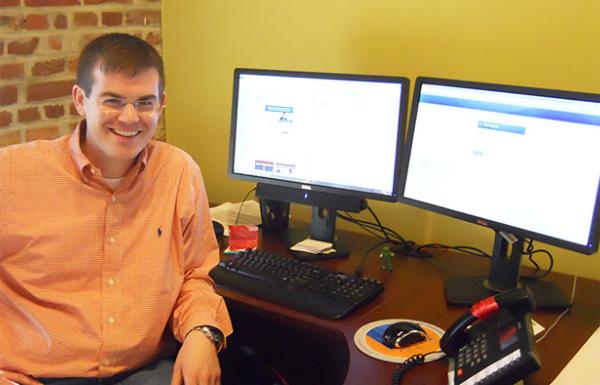
Abigail Alger
May 15, 2013
The 22Q: Jarrett Ray, Director of Online Fundraising at The Prosper Group
Enjoy the 22Q with Jarrett Ray, Director of Online Fundraising at The Prosper Group.The 22Q is an informal interview series (archives here) with young conservatives, connected to LI, who are working in the public policy process. The 22 questions ask them to explain what they do, and how they see politics and the next generation of the conservative movement. Their opinions are their own, and are not endorsed by the Leadership Institute.---Part 1: What I doHow I describe my job in 10 wordsDeveloping and executing online fundraising plans for GOP candidates and organizationsMy day-to-day at work...in three sentencesI spend the majority of my time writing and designing emails, online ads, and websites. A team of designers and developers helps me bring these ideas to life.I oversee an account manager and intern who mock up and execute online campaigns faster than most staffers can say social media.I couldn't do my job withoutA to-do list. My obsession with to-do lists is a running joke in my office. I've literally used a napkin in order to stay organized.Most important moment in my career (so far)Consulting on Mitt Romney's email prospecting effortsUnexpected skill that has helped me the mostA sense of adventure. I've been on the ground with political campaigns in six states and worked on races in dozens of others. Every campaign is an opportunity to learn about local issues and meet new people.The best advice I have receivedRather than ask questions first, always try your best to figure it out. Part 2: PoliticsThe biggest change I've seen already in politicsThe explosive change in public opinion polls on gay marriage is fascinating. I remember in 2006 when Virginia Republicans placed a marriage amendment on the November ballot as a way to help George Allen's reelection campaign. There is a lot to be learned in how gay rights activists pulled it off.The element of working in politics that most surprised meEveryone says time management is really important. They're right.The most important issue many don't see yetState and local Republicans have increasingly published back against the federal government's largesse. I think you will see a push toward more local control as a way to counter Washington overreach.Where I think the movement will be in five yearsThis is more of a trend, but online/mobile advertising will be more important than TV ads.How I formed my political beliefsI'm naturally conservative, but my activism was sparked in college in reaction to a professor who graded me down for taking a conservative stance on an opinion paper. The situation caused me to dive into political philosophy classes and take a leadership role in College Republicans. Part 3: The next generationWhat I'd say to my 18-year-old selfYou don't need to be a political science major to work in politics. You will get all the experience you need volunteering on a campaign or interning for your local state senator.(For the record, I double-majored in college and graduated with degrees in Political Science and Philosophy.)Skill or experience I'd recommend students get nowHone your writing skills now. The ability to effectively communicate opens up a lot of doors.To gain experience, write op-eds for your college paper or volunteer on a campaign and offer to assist with their social media campaign.Three things I'd tell every young political junkie to read1. Set up an email account for political emails and sign up for emails from politicians of all stripes.2. Drudge Report.3. The White Man's Burden: Why the West's Efforts to Aid the Rest Have Done So Much Ill and So Little Good by William Easterly. The focus of the book is on international development, but Easterly's realist conservative approach provides real-life examples of how to apply complex free-market ideas.My most useful class in collegeIntro to Political Philosophy. The class opened up a world of interesting thinkers to me.I met some of my closest friends (from both sides of the aisle) in that class too.Three future leaders from my generationHopefully someone reading this gets the tools they need at the Leadership Institute to start a career and become a future leader. Part 4: Me, personallyThe most fascinating figure in world historyGeorge WashingtonMy heroes in fictionWalter von Ulrich from Fall of Giants.I really love Ken Follet novels. He is a master of historical fiction.The most inspiring art I've read, seen, or heardHike to the top of a mountain and take a picture. You can't find art better than that.I'd star in House of Cards or West Wing (choose one)West Wing. Aaron Sorkin might be a liberal, but he is a great writer.I can't get through my day withoutPandora, Bose headphones, and Stride gumMy connection to the Leadership InstituteAt James Madison University, I brought the Leadership Institute to campus to give its Youth Leadership School.I went on to take the Campaign Manager, Internet Activist, and Grassroots Campaign Workshop -- all excellent. Thank you everyone who participated in the #LIJobFair #VVS13— Leadership Institute (@LeadershipInst) October 12, 2013>
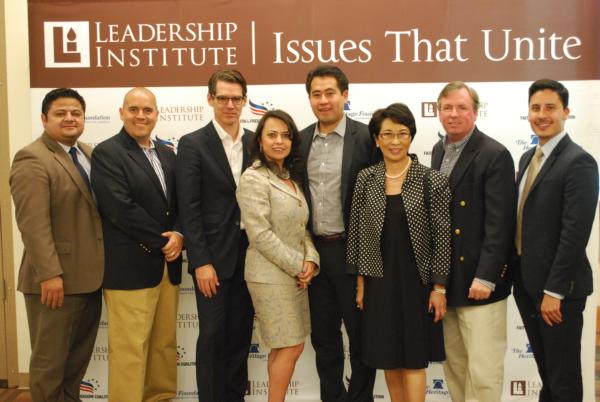
Paulo Sibaja
May 9, 2013
LI's Newest Initiative -- "Issues That Unite: Latinos & Conservatism"
Issues That Unite: Latinos & Conservatism in Las Vegas, Nevada was the first city out of eight the Leadership Institute and its partnering national organizations visited. The Leadership Institute partnered with New America, a new organization in Nevada seeking to engage minorities.The event was a success; representatives from Governor Sandoval, Senator Heller, and Congressman Heck's office attended the event as did more than 100 other individuals.The event was held at the Springs Preserve in Las Vegas, a venue known for hosting El Dia del Niño and El Dia de los Muertos (The day of the Child and The day of the Dead). Attendees were treated to appetizers and beverages as they networked prior to the events' start.The first half of the event focused on public policy and how it affects Latinos.Isreal Ortega from The Heritage Foundation discussed economic and school public policy. Leticia Gardea, a small business owner in Las Vegas, gave her testimony as a Latina entrepreneur. Tim Mooney, representing Faith & Freedom Coalition, discussed family policy.The second half of the event tied public policy to practical training.Dan Garza with The Libre Initiative talked about messaging to Latinos while Adryana Boyne from VOCES Action discussed the importance of Hispanic Media.The day concluded with an immigration panel discussion where questions regarding immigration from the audience were answered.Highlights: 1. More than 100 attendees2. Notable guests included: -Representative from Governor Sandoval's office - Representative from Senator Heller's office - Representative from Congressman Heck's office - Other candidates for public office - Leaders from New America, Libre Initiative, Heritage Foundation, VOCES Action, Tea Party Patriots and Leadership Institute3. Red Card Solution,The Heritage Foundation, the Leadership Institute, and VOCES Action all distributed helpful materials to every attendee>

Abigail Alger
April 30, 2013
The 22Q: Gabriella Hoffman, Twitter Activist and LI Staffer
Enjoy the 22Q with Gabriella Hoffman, conservative activist and Regional Field Coordinator at the Leadership Institute.The 22Q is an informal interview series with young conservatives, connected to LI, who are working in the public policy process. The 22 questions ask them to explain what they do, and how they see politics and the next generation of the conservative movement. Their opinions are their own, and are not endorsed by the Leadership Institute.--- Part 1: What I doHow I describe my job in 10 wordsWorking with students to advance conservatism on campus is rewardingMy day-to-day at work...in three sentencesChecking my email; updating our database with student contacts; reaching out to students via phone call, Facebook, or email; eating; talking with co-workers; researching and finding liberal bias.I couldn't do my job withoutSunny optimism. I try to be positive and happy all the time. Challenging the left can be daunting, so I try to make the best of things handed my way.Most important moment in my career (so far)Being mentioned on the Rush Limbaugh Show for an interview I did for FoxNews.com on January 11, 2013. He mentioned my thoughts about payroll tax expiration. I was in disbelief! My dad, a huge Rush fan, called me the moment he heard my name on the air. It was amazing.Unexpected skill that has helped me the mostI would say that multitasking has helped me the most. Juggling many things can be difficult at times, but it has proven to be beneficial in the work IThe best advice I have receivedMy dad once said, "In order to be equal, you have to be three times better than the rest." My parents taught me to work hard, to enjoy the fruits of my labor, and to be the best individual I could possibly be. Part 2: PoliticsThe biggest change I've seen already in politicsThe rise of political correctness and cultural Marxism. Too many people are easily offended and afraid to stand up for their beliefs out of fear of being ostracized. It's time to put bullies in their place.The element of working in politics that most surprised meWhat a small world conservative politics is. You meet people who know your friends or people who have some connection to you. It can be a curse or it can be a blessing.The most important issue many don't see yetThe threat of revisionist history. Whenever historical facts are twisted or misrepresented, people are taught to resent and equally despise this country. We cannot forget our past and allow lies to define our future.Where I think the movement will be in five yearsIf we continue to be conservative and push actual reforms, our movement will be successful. If we continue down this path of caving and moderation, we're doomed to be obsolete. There's already one leftist movement in America. We don't need another one.How I formed my political beliefsMy parents are Lithuanian immigrants who fled the Soviet Union. Therefore conservatism came naturally to me. Embracing collectivist or Marxist viewpoints was strictly forbidden in our house. Conservatism best encourages freedom and opportunity. Part 3: The next generationWhat I'd say to my 18-year-old selfI'd say that it's good that we kept our principles and didn't listen to detractors. Many people wanted me to fail, and I wouldn't let them have it. I tell my students and fellow conservative to never give up on their principles or change their views.Skill or experience I'd recommend students get nowSocial media. It's imperative for students to acquaint themselves with Twitter, Facebook, Pinterest, and similar media.Three things I'd tell every young political junkie to readGod and Man at Yale by William F. Buckley, the Drudge Report, and Counter CulturedMy most useful class in collegePolitics of the Middle East. My professor was a founder of the Political Science Department at the University of California at San Diego. He was fair and gave an accurate account of the Arab-Israeli conflict.I learned a lot about the Middle East thanks to his class. I learned to help students battle anti-Semitism and anti-Israelism on campus.Three future leaders from my generation1. Katie Pavlich, Townhall.com News Editor2. Ben Shapiro, author of Bullies: How the Left's Culture of Fear and Intimidation Silences Americans3. Ryan T. Anderson, Heritage Foundation Fellow and co-author of Why Marriage Matters Part 4: Me, personallyThe most fascinating figure in world historyWinston ChurchillMy heroes in fictionEdmund Dantes of Alexander Dumas' The Count of Monte Cristo and Jay Gatsby of The Great GatsbyThe most inspiring art I've read, seen, or heard"Waterlilies" by French Impressionist painter Claude Monet. His countless paintings of waterlilies are captivating.I'd star in House of Cards or West Wing (choose one)House of CardsI can't get through my day withoutChatting it up with my coworkers. A healthy work environment is key to one's success at any job. A happy workplace makes for a happy employee!My connection to the Leadership InstituteI'm currently the Northeast Regional Field Coordinator. Prior to working at LI, I went to a Youth Leadership School in February 2010 and completed a TV training in summer 2012.>
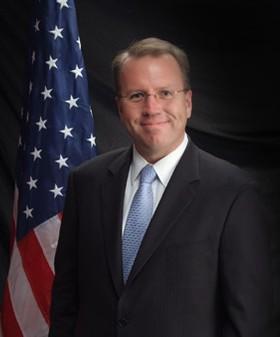
Ron Nehring
April 24, 2013
Eight Rookie Mistakes to Avoid on the Campaign Trail
If you're doing your job as a candidate or party leader, you're going out speaking with a lot of people you haven't met before. When they don't know much about you, it's human nature to make quick judgments based on what little information they do have.First time candidates, particularly for local office, often send signals that undermine credibility among potential supporters, costing them votes, volunteers, donations, or all three.People make decisions based on cues and signals, and initial impressions can have a lasting impact. Here are eight unforced errors you can easily avoid.Loner = loser. Speaking at the Chamber of Commerce lunch? Showing up by yourself tells everyone you have no supporters in the room. Instead, arrive with a volunteer whose job it is to accompany you while you're chatting with people, helping in taking down notes for follow up, and carrying endorsement cards. When working a crowd and confronted with that weirdo who wants to chew your ear off about privatizing sidewalks, have your body man leading you, setting up the next person to talk to, and politely motioning you to the next person when he sees you're pinned down. Bonus: Let a member of the group you're speaking to know you're coming, and have him meet you at the door when you arrive and walk in together to show other members you have support already.Flag ties. Ronald Reagan was a great American patriot, and he didn't have to prove it by wearing a flag tie — a novelty that you should probably put up on eBay. Want to show your patriotism? Wear a small flag pin on your lapel. Cheap-o pens. “Ok, let me write your number down.” While you're writing, the person standing in front of you is looking straight at your hand. If it's holding a two year old Bic with the end chewed off, you don't look as impressive. Mont Blanc gets $450 for a pen not because it doesn't matter, but because it does. Yours doesn't have to break the bank, but a proper pen sends a subtle signal you have your act together. FREE OFFER! Business cards. Companies like Vista Print have nice offers for “free!” business cards using very generic templates that people like me who meet candidates a thousand times have seen – about a thousand times. While you're at it, have Vista put “I'm not taking this race seriously enough to invest in sending the right message to donors, volunteers, and stakeholders.” Spend a few bucks more on proper business cards that show you mean business.“I lost weight!” shirt collars. So you dropped 20 lbs walking all those precincts – fantastic! But if you don't trade in those collared shirts for ones that fit your new neck size, you're going to look like an anorexic or an addict, and your sloppy appearance will show in all those photos posted to Facebook.Bush or Clinton era shoes. Look down right now. If those shoes weren't purchased during the Obama Administration, take them off, put them in the closet, and wear them for gardening. When you're at events, it's surprising how often people are looking down. High end Hugo Boss isn't required, but they should be new and clean.Dark button-down shirts. If you're wearing a black button-down shirt, a tie and a blazer, congratulations, you look like a bouncer at a bar. Ditch the Sopranos look for now and go with a white or light blue shirt. Still have doubts? Turn on C-SPAN. See any elected officials with your bouncer costume? Exactly.Rookie@gmail.com. That's the message you're sending with your “I'm using this email address until I lose” Gmail or Yahoo account. For $10 at GoDaddy.com you can register your own private domain name, then sign up to have email to that address forwarded to your regular email address.For women candidates: no question about it, you have a tougher job than the boys when it comes to attire. The press pays more attention to what women leaders wear, just ask Hillary Clinton. Yet in most cases, the target audience consists of voters and stakeholders, and not the press, so don't worry about the writeup. Rule of thumb: middle of the road. Too flashy or too mannish and you'll turn people off. Not too much jewelry and definitely not too much perfume. If you hug someone and they can smell of your Chanel an hour later, it was too much. More food for thought in this New York Times story – The Fashion Conservatives.People are careful with where they invest their vote, their time, and their money. Switching from amateur to pro before you hit the field helps you maximize the return on every hour you're putting into your campaign. Ron Nehring is a volunteer faculty member for the Leadership Institute, where he speaks at LI campaign management schools and activists workshops all across the country. Under Ron's leadership as the former chairman of the Republican Party of California, they raised more $73 million, permanently retired over $4 million in debt, and instituted a wide array of management and financial reforms. He currently serves as a consultant and is the chairman emeritus of the California Republican Party. Read his full bio here.This “Expert Insights” article is a part of a regular series which delves into the mechanics of political technology. LI staff, faculty, graduates, and conservative friends are welcome to submit an article by contacting Lauren Day at Lauren@LeadershipInstitute.org>

Abigail Alger
April 23, 2013
The 22Q: Francesca Chambers, Editor of Red Alert Politics
Enjoy the 22Q with Francesca Chambers, Editor of Red Alert Politics. Red Alert is an online publication managed by young conservatives, produced for young conservatives from the parent company of The Weekly Standard and The Washington Examiner.The 22Q is an informal interview series with young conservatives, connected to LI, who are working in the public policy process. The 22 questions ask them to explain what they do, and how they see politics and the next generation of the conservative movement. Their opinions are their own, and are not endorsed by the Leadership Institute.--- Part 1: What I doHow I describe my job in 10 wordsBringing news to young Americans from a center-right perspective.My day-to-day at work...in three sentencesMost days I start work at 8am or 9am and don't finish work until 8pm or 9pm. A large portion of my day is spent looking for story ideas for Red Alert's reporters and helping them shape their articles. I love appearing on TV because it serves as a nice break from the monotony of sitting behind a desk all day.I couldn't do my job withoutTwitter. Twitter has erased the barrier, in many cases, between the “old guard” media outlets and newer, online-only publications like Red Alert, The Daily Caller, and Buzzfeed. Also, my amazing team of reporters.Most important moment in my career (so far)Launching Red Alert Politics. Being offered the opportunity to launch my own publication was a dream come true. I will always be grateful to my then-boss Bob Benz for plucking me out of obscurity and taking a chance on me.Unexpected skill that has helped me the mostThe ability to “see” news stories everywhere I go. My fiancé and I joke that it's a disease because we'll be out running errands and – wham! – I'll be struck with a unique idea. Then I rush home so I can get it down in writing before I lose sight of it. It's impossible to turn off.The best advice I have receivedIf you have a positive attitude and work hard, someone will notice you and offer you a job. Likewise, no job is too small when you're starting out. I wish I'd heeded that one more often. Part 2: PoliticsThe biggest change I've seen already in politicsTwitter has completely changed the way campaigns are managed and reported. Twitter is both a politician's best friend and worst enemy. Candidates who run their own Twitter accounts are more likeable because they seem more down-to-earth. But we all know the pitfalls of Twitter as well…The element of working in politics that most surprised meI hated working directly for candidates.The most important issue many don't see yetStudent loan debt. It really is the next bubble – and all of us who borrowed responsibly will be on the hook (through taxes) to pay back the federal loans of those who didn't.Where I think the movement will be in five yearsThe conservative movement is at a crossroads. Social and fiscal conservatives seem poised to split and head down totally different political paths, with many fiscal conservatives joining the ranks of the libertarian movement. The next presidential election will be a good measurement of where the movement truly stands.How I formed my political beliefsI grew up in Kansas. I was born a Republican. My parents weren't well off, and I had to work for everything I've ever had. I bought my first car. I paid my own way through college. That kind of life experience makes you really cringe at the idea of your hard-earned money involuntarily going to other people who aren't willing to work hard for what they have. Part 3: The next generationWhat I'd say to my 18-year-old selfDon't be so dramatic. Chin up; it will get better. You have your whole life ahead of you still.Attending an in-state school with low tuition is the best decision you will ever make.Don't let anyone else define you.Skill or experience I'd recommend students get nowLearn to write compelling editorials. If you want to work in government relations, public relations, campaigns, or on Capitol Hill, you need to be able to write decent opinion articles promoting your client, cause, or product.Three things I'd tell every young political junkie to readRed Alert Politics and its sister publications The Weekly Standard and The Washington Examiner, of course! Outside of my attempts at shameless self-promotion, you absolutely need to be reading POLITICO and the Huffington Post.My most useful class in collegeIn one of my mid-level journalism classes, they made us learn how to write press releases, shoot and edit video, copy edit, etc. – things that had nothing to do with print reporting. I hated the class, but now I'm appreciative. It was my ability to do those things that made me an asset.Three future leaders from my generationBethany Bowra, Brandon Kiser, and Shoshana Weissmann Part 4: Me, personallyThe most fascinating figure in world historyJesus. I know that sounds trite, but He really does fascinate me.My heroes in fictionDagny Taggert of Atlas Shrugged. The world could use more strong, conservative females like her. (I don't get a lot of time to read fiction anymore; read it while you still have time, kids!)The most inspiring art I've read, seen, or heardI'm a huge fan of Degas. When I own an original Degas dancer painting, I'll know I've made it.Earlier this year I went to see Starry Night and The Scream at the Museum of Modern Art. They really are the works of art they are said to be. Go see the exhibit if you get a chance.I'd star in House of Cards or West Wing (choose one)West Wing. I'd be the White House press secretary after C.J. becomes the Chief of Staff.I can't get through my day withoutChecking Twitter, even if it's just for a minute. I'm addicted. My now-fiance almost declined a second date with me because I looked at my phone once during the date. Now he's worse than me (and has more followers). I can only blame myself.My connection to the Leadership InstituteI worked for Campus Reform for the first half of 2011 and served as a new media faculty member. I'm a graduate of several trainings, including the television training – which I highly recommend.>

Carol Wehe
April 18, 2013
Your Brand Online
Your online content is how many people judge you these days.I Google strangers all the time to find information about them. What used to be creepy is now the norm.Make sure your online brand shows others what you want them to see. Here are the bare necessities:- LinkedIn – get a profile, fill it with your expertise, and connect to as many friends and professional contacts as possible. It's not a very active site (read – you only have to do something with it when you change jobs or learn a new skill), but LinkedIn is the best way for people to browse your professional expertise and network.- Twitter – hey, I'm in new media. If you have a twitter account, post about what you're interested in, and also what you claim expertise in – and keep it up to date.- Facebook – it doesn't have to be public, but keep the public part of your profile at least semi-professional looking. Make sure your profile pic, cover photo, about you, and favorite quotes sections are things your boss could see – because she can.- Blog –use Wordpress or Tumblr to make your blog look nice for free. And remember – like everything else online, act like the world is judging you by your content – because it is.And side note – use a first and last name sort of email. The world looks down on supergirl@aol.com sending professional emails.So, go out there and show the world a better you – online.>

Abigail Alger
April 17, 2013
The 22Q: Bonnie Kristian, Communications Director of Young Americans for Liberty
Enjoy the 22Q with Bonnie Kristian, Communications Director of Young Americans for Liberty (YAL), the largest, most active, and fastest-growing pro-liberty organization on America's college campuses.The 22Q is an informal interview series with young conservatives, connected to LI, who are working in the public policy process. The 22 questions ask them to explain what they do, and how they see politics and the next generation of the conservative movement. Their opinions are their own, and are not endorsed by the Leadership Institute.--- Part 1: What I doHow I describe my job in 10 wordsWriting, editing, and adding GIFs to all of YAL's communicationsMy day-to-day at work...in three sentencesI write a lot of emails, reports, and activism guides for YAL members and donors. I manage a social media intern, a graphic designer, and a team of 250+ student bloggers. And I serve as human Google for coworkers' miscellaneous grammar questions.I couldn't do my job withoutThe internet. Obviously. When the internet goes down, I can do little to no work. Almost everything I do is online.Most important moment in my career (so far)This is hard. But I've got to go with getting an internship on Ron Paul's 2008 campaign. That was my first introduction to working in politics, and it opened doors which led to my positions first at the Leadership Institute and now at YAL.As a bonus, it's where I met my husband.Unexpected skill that has helped me the mostMicrosoft Paint! I'm mostly kidding, but it is helpful for quick (read: awful) mock-ups of what I'm trying to order from our graphic designer. He tells me my Paint works are fantastic, but I think this might be a lie.The best advice I have receivedPeople have half the attention span online that they have when consuming physical, printed information, so when writing online communications -- from emails to blog posts and everything in between -- always keep it short.Brevity is not just the soul of wit; it's also a major determining factor of whether your online audience is ignoring you. Part 2: PoliticsThe biggest change I've seen already in politicsSimple: the rise of the liberty movement. In 2007 Ron Paul was laughed at for his consistent support for small government at home and abroad. Now the Republican Party is increasingly willing to come our way.The CPAC 2013 straw poll results -- especially the questions about drones, foreign policy, and attendees' top priority in politics (not to mention the presidential picks) -- are very revealing of the change we are seeing in the GOP.The element of working in politics that most surprised meIt really is who you know. This is a cliche, I know, and probably something I should have expected, but the extent to which personal connections play a role in getting jobs, cooperating with other organizations, and succeeding in most aspects of working in politics can't be overestimated.The most important issue many don't see yetWar is just one more big government program. If we're going to be serious about limiting government, there can't be any more sacred cows.Defense is the primary purpose of government, of course, but having troops in more than three-fourths of countries around the world while maintaining multiple no-win wars is aggression, not defense -- and conservatives would (rightly) oppose any similarly out-of-control program here at home.Where I think the movement will be in five yearsThe conservative movement is heading slowly but surely in the direction of liberty -- and I think that's fantastic. It's clear that the enthusiasm among young conservatives is overwhelmingly on the libertarian end of the spectrum, and in five years I think the movement as a whole will be much more in line with where the youth are already going.How I formed my political beliefsI got interested in free-market economics in high school after reading Henry Hazlitt's classic Economics in One Lesson. From there, it was a matter of figuring out where I stood on a larger range of issues, having already established a commitment to individual liberty and small government. I majored in political science, so I had plenty of opportunities to do that in college. Part 3: The next generationWhat I'd say to my 18-year-old selfDon't stop reading. All the studying to finish college early will be worth it.Don't be so quiet. People want to hear what you have to say.Don't get that perm. It will not turn out well.Skill or experience I'd recommend students get nowAbove all, learn to write well. It's an employer's market these days, and no one wants to hire a kid who can't write a coherent sentence. When I review intern applications, I place far more weight on writing ability than, for instance, the applicant's college major -- and everyone I know in a hiring position does the same.As a very close second: pick up some HTML, CSS, and more advanced coding skills if you have time. In any office setting, if you're the one who can troubleshoot the blog until tech looks at it, that's a good thing.Three things I'd tell every young political junkie to readLiberty Defined by Ron Paul. Even if you don't agree with everything he says, this quick overview of his ideas on 50 major issues of our day is perfect for those who want to systematically think through their own political convictions.Books and articles by people you disagree with -- especially if you're worried that doing so will make you change your mind. Insulating yourself from conflicting ideas puts you in danger of being more interested in feeling right than seeking truth.Nothing too serious on the weekends. Okay, so it doesn't have to be the weekend, but take a day off from politics from time to time. Read a novel. Watch TV. The country won't go to hell in a handbasket because you missed one news article.My most useful class in collegeLogic. No question about it. It's not like I'm making syllogisms on a daily basis, but in politics it never hurts to fine-tune your logic deficiency detection tools.Three future leaders from my generationRep. Justin Amash. One of the youngest members of Congress, Rep. Amash is smart, principled, transparent, and he personally runs a hilarious Twitter account.Jeff Frazee. Is it sucking up to list my boss? Probably. But Jeff is the founder of Young Americans for Liberty as well as our Executive Director, and YAL is the largest, most active, and fastest-growing liberty organization on America's college campuses. All this, and Jeff only just turned 30!Sen. Rand Paul. OK, so he's old enough to be my dad, but Rand Paul's pro-liberty ideas represent my generation -- and compared to members of the GOP establishment like John McCain and Lindsey Graham, he's young too. Part 4: Me, personallyThe most fascinating figure in world historyIt's a three-way tie among C.S. Lewis, Gladys Alyward, and Beyonce.My heroes in fictionSherlock Holmes, Robin Hood, Peter Wimsey, Doctor Who (technically TV, yes, but not reality TV, so I'm going with it), Hercule Poirot, Father Brown -- are you noticing a trend? I read a lot of late 19th and 20th century British mystery novels.The most inspiring art I've read, seen, or heardThere's a band called Gungor, whose music is at once modern and liturgical. Their last three albums -- and particularly 2010's Beautiful Things -- are simply incredible in terms of musical skill, lyrical beauty, and ability to communicate theological truth. I say this as someone who is really terrible at appreciating music.I'd star in House of Cards or West Wing (choose one)I've never seen West Wing, so I guess House of Cards? But I think my role would be really short because I'd be too naive and get fired or something. I can't get through my day withoutHanging out with my guinea pig. Contrary to popular belief, guinea pigs can be pets for grown-ups!My connection to the Leadership InstituteMorton Blackwell, LI's president, hired me straight out of college and gave me my first "real" job, as he has done for so many young people who want to get their foot in the door of politics. I was able to move to the DC area and helped LI launch Campus Reform as its first dedicated staff member.My current organization, Young Americans for Liberty, rents office space from LI, so I haven't strayed too far.>
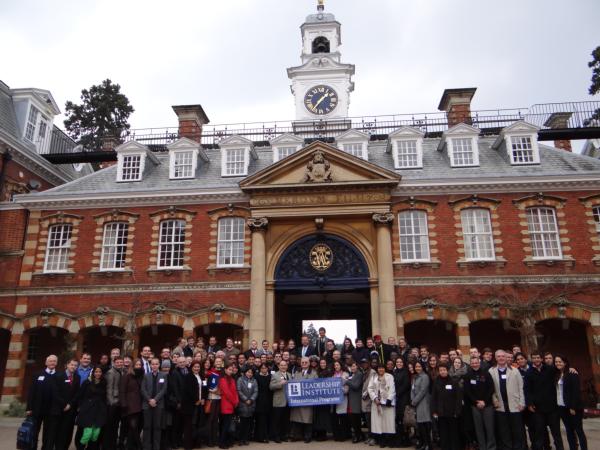
Miguel Moreno
April 11, 2013
108 Conservatives From 30 Countries Get Trained in England
Fundraising is not just about asking for money, but about developing relationships with people who share your vision and want to be your partners in bringing change to society. Your donors are not just a source of money -- like a bank machine -- but partners, so keep them informed about the progress you are making and let them know how their contributions are helping. These were a few of the main concepts in Morton Blackwell's opening speech at the sixth annual International School of Fundraising held at the beautiful Wellington College in Berkshire, England.Over four days, 108 people from 30 countries and four continents, met at Wellington College from March 26 to 30. Seventeen renowned experts in fundraising, from the US, Europe, and Latin America, delivered 35 lectures teaching vital skills necessary to succeed financially as a political leader or as an organizational entrepreneur. Social entrepreneurs learned how to:Build strong donor relationsDevelop fundraising strategiesPlan effective fundraising eventsUnderstand online fundraisingAdapt fundraising methods to their home countriesSpeakers included major players in the field such as Morton Blackwell, Bruce Eberle, Stephen Clouse, Rick Hendrix, Kevin Gentry, Justin Murff, Brian Davis, Katherine Eberle, Ron Nehring, and Alejandro Chafuen, and Silvio Dalla Valle from Italy, Mathias von Gersdorff from Germany, Tim Evans and Matthew Elliot from England, and Jose Antonio Ureta from France.While the day was packed with a lot of learning, after dinner, students congregated at the on-campus pub for networking and sharing stories. Students from Argentina, Brazil, Bolivia, Colombia, Chile, Ecuador, Venezuela, Guatemala, United States, Mexico, Canada, United Kingdom, Romania, France, Spain, Italy, Croatia, Slovakia, Germany, Kazakhstan, Moldova, Sweden, Denmark, Poland, Austria, Nigeria, Tanzania, Zimbabwe, South Korea and Mongolia met at the pub.As we spoke to one another they learned how similar the social problems are around the world and how we all face the same obstacles in solving those problems. Students found it motivating to learn that they were not alone. Networks for knowledge-sharing and support developed.On the night of Friday, March 29, the International School of Fundraising concluded with a gala dinner lit by candlelight. At the dinner, Morton Blackwell and Miguel Moreno of the Leadership Institute and Benjamin Harris-Quinney of the Bow group presented the Global Leadership Award, which recognizes exceptional work done by individuals around the world. This award is granted jointly by the Leadership Institute, the Bow Group, the World Congress of Families/ Howard Center for Family, Religion, and Society, and The Institut de Formation Politique. The Global Leadership Award embodies a non-partisan network of leaders who aim to bring ideas to power and to give power to ideas by stimulating dialogue and discussion about critical international conservative issues.During his speech, Morton Blackwell said, “We recognize and honor the unfaltering dedication of some remarkable individuals, who through their consistent faith, solid professionalism, and unwavering commitment to the conservative cause are making an international impact” and that “this joint award seeks to encourage the best forms of international engagement to meet the global challenges of the 21st century.“Recipients of the Global Leadership Award are: Nic Conner, Donna Edmunds, Samuel Kasumu, Karolina Vidovic Kristo, Pauline Fynn, Jack Chubb, Mark Eastham, Adryana Boyne, Marie-Noël Julienne, Eric Martin, Simon Cossiez, Adeyemi Ikuforiji, Sylva Ashimole, Juan Carlos Lazarte, Alexander Mooney, Lorenzo Montanari, Zeljko Zidaric, Amanda Sanchez, Luz Elena Delgado Flores, Ron Nehring, Oliver Cooper, Onyebuchi Monica Madiebo, Marco Respinti, Vanesa Anez, and Marcel Lazar.LI appreciates their contributions of time and talent to increase the number and effectiveness of conservative activists and leaders worldwide. It takes a special kind of person to be an activist. While most people might get angry and complain – these people decided to act. Not only did they see the problem, they found a solution. They acted.They are activists.Saturday, for those that left on later flights, was a day of sightseeing in London. From Big Ben to the London Eye, from Parliament to Westminster Cathedral and Westminster Abbey, thousands of pictures were taken with new friends. The overall goal of the training was not to feed delegates with a fish, but to teach them how to become extraordinary fishermen. The training that was provided is just the start. Betterment of the world comes from the work that activists do with the training. The world now has 108 newly empowered social entrepreneurs returning to their home countries, empowered, energized, and ready to make a difference! We wish each and every one of those activists the best of luck.>

Leadership Institute
March 26, 2013
Announcing Issues that Unite: Latinos and Conservatism
The Leadership Institute, in partnership with The Heritage Foundation and Faith & Freedom Coalition, launched today Issues that Unite: Latinos and Conservatism (ITU). Experts in education, and economic public policy as well as Hispanic media will teach at seven workshops to engage Latinos and activate conservatives.The series of workshops will be held in six states with large Hispanic communities. You can see them on LI's 2013 training calendar.“America's emerging face requires a shift in outreach efforts,” said Paulo Sibaja, Director of Coalitions at the Leadership Institute. “Conservatives failed to communicate our proven philosophy to Latinos effectively. That is why we have launched the first phase of a long term project to reach Hispanics. Through our efforts that merge policy and practical training, conservatives and Hispanics will lead the nation hand in hand.”“Opportunity is precisely what Hispanics are looking for when we consider what's desperately needed to return America to what so many of us came here looking for,” said Israel Ortega, Editor of Heritage Libertad at The Heritage Foundation. The Heritage Foundation is the nation's most broadly supported public policy research institute, with hundreds of thousands of individual, foundation and corporate donors. “Hispanics consider family and family cohesiveness a valuable pillar of their community. Our shared faiths are as diverse as the community and the desire for freedom is evident in how we live our lives,” said Gary Marx, Executive Director of the Faith & Freedom Coalition. The Faith & Freedom Coalition is a non-profit organization with an avowed commitment to educating, equipping, and mobilizing people of faith and like-minded individuals to be effective citizens.>

Morton Blackwell
March 21, 2013
Remembering Judge Robert Bork: Conservative Legend and Leadership Institute Donor
Remembering Judge Robert Bork: Conservative Legend and Leadership Institute DonorBy Morton BlackwellThe staff of the Leadership Institute honors generous donors who make the work of the Leadership Institute possible. We are saddened at the death of one of our long-time donors, conservative hero Robert Bork. The Leadership Institute received Judge Bork's final donation just one day before he died. My staff and I honor Judge Bork, a stalwart for judicial conservatism.Conservatives will remember Robert Bork as President Ronald Reagan's nominee to the U.S. Supreme Court in 1987. I attended his recent funeral.Along with other conservatives, I was thrilled when the president nominated Judge Bork. He graduated from the University of Chicago and was a professor at Yale Law School for over 15 years. This brilliant man, who served in the Marine Corps before and after obtaining his law degree, would be a boon to conservative principles and values on the Supreme Court.But it was not to be.Defender of the Constitution meets liberal onslaughtIt soon became clear that the liberals in office were going to stop his nomination. Joe Biden, then Chairman of the Senate Judiciary Committee, led the charge against Judge Bork.Bork was criticized for stating that the Constitution should be interpreted as the framers originally intended. Rumors began to circulate that the Reagan administration might quietly ask Bork to request that his name be withdrawn.But Bork—and conservatives—wanted a vote, because conservatives had every intention of holding senators who voted against him accountable.During the nomination proceedings, I wrote a personal letter to Ronald Reagan, asking him to make sure the Senate voted on Bork's nomination. I thought it would be a terrible mistake for the Bork nomination to be withdrawn—there had to be a recorded vote for many good reasons.About a week later, I received a letter back from President Reagan. He assured me that he intended to keep the nomination active and force the Senate to vote on it.A liberal-controlled Senate rejected Judge Bork's nomination in a hotly-contested 58-42 vote.Bork: Friend of Reagan, Friend of MortonI was happy to receive that letter of assurance from the President, but I was by no means confident that he had actually seen the letter—it might have just been drafted in the Presidential Correspondence office.Some years later, a friend was researching at the Reagan library. There, he found my original letter to the President, the President's hand-written draft of a response to me, and a copy of the final letter which was typed word-for-word as Reagan had drafted it. It moved me to learn that President Reagan had personally penned his response to me.LI and Bork: mutual support of conservative principlesMy acquaintance with Robert Bork goes back to the 1970s, long before the Supreme Court nomination. While Robert Bork was a professor of law at Yale University and I was on the U.S. Senate staff, I brought his son Charles Bork to intern for me.After Bork's rejection by the Senate, Leadership Institute graduates led a 200-strong protest against liberal Republican Arlen Specter, who along with Senator Biden and Senator Ted Kennedy, opposed Bork's nomination.In 1995, a Leadership Institute graduate at the University of Oklahoma battled and outwitted liberal Professor Anita Hill (the one who lobbed allegations against Justice Clarence Thomas) to bring Bork to standing room-only lectures at that university.And since that year, Judge Bork has been a faithful donor to the Leadership Institute. But not only a donor, Bork also gave talks to gatherings of Leadership Institute donors.Robert Bork believed in the Leadership Institute's work of training conservative activists and students on college campuses throughout the nation.My staff and I thank him for his 17 years of sustained and loyal support. Our condolences go to the family and friends of the Honorable Robert Bork.>
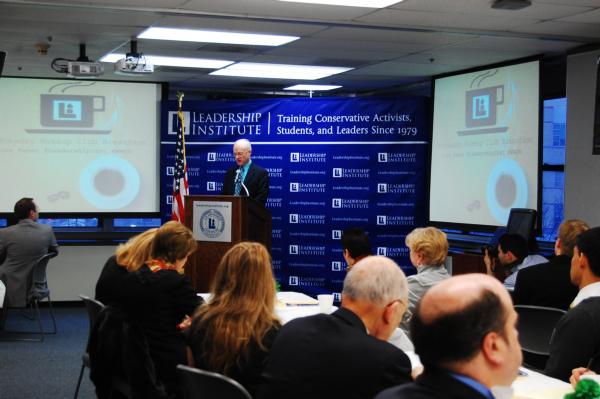
Leah Courtney
March 7, 2013
A Snow Globe of Reagan’s Vision
On a snowy Wednesday morning, the Leadership Institute welcomed Dr. George Nash, author of The Conservative Intellectual Movement in America Since 1945, for LI's monthly Wednesday Wake-Up Club Breakfast.Dr. Nash is an independent scholar, historian, and lecturer. He specializes in twentieth century American political and intellectual history, which includes the life of Herbert Hoover and the legacy of Ronald Reagan. Dr. Nash is also a senior fellow at the Russell Kirk Center for Cultural Renewal.While sharing President Reagan's original vision for America, Dr. Nash reminisced, "Reagan could make his point sharply without offending people. His humor had an ecumenical quality.”He went on to explain how President Reagan feared that America's memory was slipping away. Dr. Nash described the challenges to Reagan's vision of American exceptionalism.President Reagan once said, “I am not a great man. I am a man of great ideals.” Dr. Nash implied that many who intend on running for office or are in office today should embrace a similar mindset.Jean Morrow, an intern in the development department atLI, said: “It was a sobering experience listening to Dr. Nash talk about President Reagan and how he cultivated the idea that America is exceptional.”Dr. George Nash closed with the notion that Reagan had a national narrative that still resonates today: “If he can rally the city on the Hill, why can't we?” Please join LI at April's Wake-Up Club Breakfast on April 3 to hear Gun Owners of America's Executive Director Larry Pratt. Sign up here. >
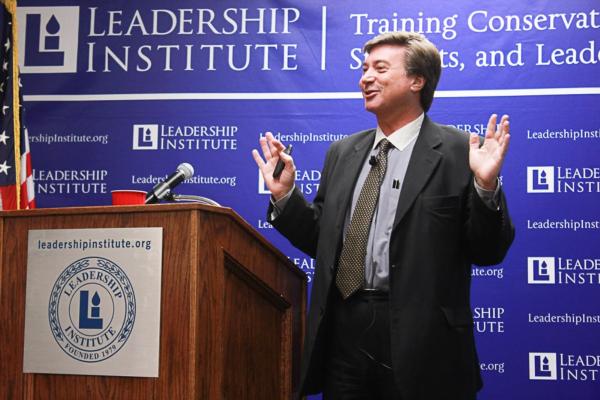
Justin Fiehrer
February 22, 2013
The Civil Service: How to Cut Through the Bureaucracy
The Leadership Institute hosted the first Civil Service Opportunity School in more than two years this past Tuesday and Wednesday evenings. The 24 students that attended learned a variety of things about the civil service including its history, how it works today, and what it takes to get a job in the government.The first lecture titled, “Why the Federal Government?” was taught by Mark Johnson, a supervisory IT specialist with the Department of Commerce. Mark discussed the hiring process, the roles of networking and tips to navigate your way through federal job searches.“The federal government has tremendous flexibility that allows you to move from one job to the next,” he said.The U.S. government is the largest employer in the nation which includes many career options and locations for potential employees to choose from.LI's 2006 Civil Service Opportunity School helped Mark get his current position. He said, “The Leadership Institute helped me move from Denver to DC, and then from the private sector to the civil service in 2008.” One of the Leadership Institute's interns this spring, Leah Courtney remarked on Mark's experience: “I really appreciated hearing his experience in the civil service and all the tricks of the trade he provided.”Terry Campo, who served as special assistant and chief of staff for the General Counsel of the U.S. Department of Energy during the Reagan Administration discussed the origins and purpose of the civil service.Terry explained the structures of executive agencies and the relationship between political appointees versus career employees. Terry commented on how political appointees and the employees under them are chosen.“It's supposed to be politically fair, but in reality it's not,” Terry said. One of the best resources is job directories where jobseekers can find the best person to contact regarding employment. Laura Turner, a current intern for Judicial Watch, thought his resources were helpful to her job search.“He was very helpful explaining how to tailor resumes. I will definitely be using his tips for future job searches,” Laura said.George Nesterchzuk, who served as a senior official in the Reagan Administration, talked about the political management and environment of the civil service. His best advice came on Wednesday night.“The civil service is protected by a very thick book of rules and regulations. My best advice is to get your application in to every opening there is in the federal government,” George advised.Eldon Girdner, who has more than a decade of service in the federal government, discussed the application process and navigating through it. He also talked about where and how to find jobs in the civil service.Eldon talked about how best to tailor resumes for federal jobs, and their differences from resumes for the private sector.“When searching for federal jobs, the more information you have on your resume the better because computers search through resumes and match up key words before they actually reach a person,” he explained.The students attending left the civil Service school with knowledge from faculty with years of service in the public sector. These students now know how to maneuver their way into a federal job and start tearing down the wall of bureaucracy.The Leadership Institute offers several career related workshops throughout the year. Go here to register for one. >
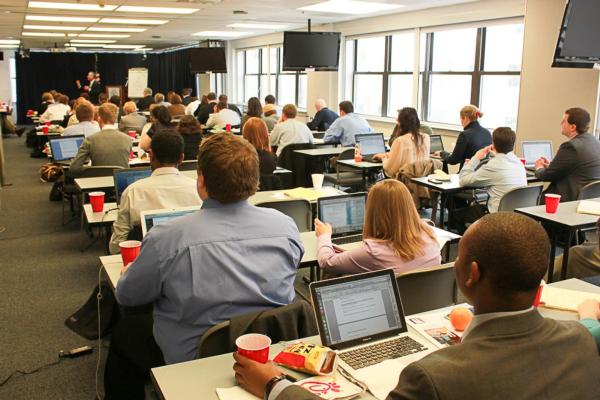
Ulrik Boesen
February 15, 2013
80 Conservatives Now Ready to be Campaign Managers!
Last week 80 conservative activists gathered at the Leadership Institute headquarters for an intense four day Campaign Management School (CMS).Tea party leader from Charleston, South Carolina Dean Allen said, “I have been involved in politics since I was the Galveston County youth chairman for Barry Goldwater in the 1964 presidential race. I ran Ronald Reagan's GOTV operation in Galveston County. I consider myself an expert in politics who is well trained and knows the ropes very well. I was very pleasantly surprised at the quality of instruction, the broad scope of activities covered, and all the things I either did not know as in depth as I had thought; or, at the technology and newer methods that are more efficient. I learned a huge amount every day! I strongly recommend the educational programs of the Leadership Institute to any conservative activist who cares about the future of our republic and plans to be involved in the process of saving America.”Twenty-two of the nation's top political operatives served as volunteer faculty to these 80 aspiring campaigners. On day one Mike Rothfeld, president of SABER Communications, taught LI students the “Real Nature of Politics” and how to organize a campaign.Leah Holloway, a grassroots activist from Norfolk, Virginia said, “What a breath of fresh air! Rothfeld's delivery was awesome. His lecture was informative and truthful. I just can't get enough of this man! His insights make me question what I thought I already knew.” “ABCs of Polling,” lecture was taught by Tyler Harber, a partner with Harcom Strategies, where he described the purpose of polling and emphasized the importance of polling strategy.With 22 seasoned faculty, the lineup included: Mark Kelly, deputy chief of staff for Congressman Tim Huelskamp, who lectured about the importance of precinct organization; John Tate, president for Campaign for Liberty, who taught students the ins and outs about fundraising via direct mail; Terry Campo of The Campo Group who taught about opposition research; Edward King, director of programs & operations at Young Americans for Liberty, who spoke on different strategies for getting out the vote; Jordan Lieberman, president of CampaignGrid, who gave a great lecture on the newest campaign technology; Steve Sutton, former chief of staff to three freshmen Members of Congress and presently, LI's vice president of development, who spoke on message development; and many others.Elisabeth Jessop, currently a campaign manager, said, “I loved the lecture on developing your message by Steve Sutton. The four boxes was a great illustration of how to approach political opponents and how to create a positive message to your supporter!”The training saved the very best for last when Leadership Institute President Morton Blackwell lectured on the handling of negative information. Amazingly, students were still eager to learn more after four days of intensive training.Personhood Florida state coordinator Brenda Macmenamin said, “My favorite was Morton Blackwell just talking to us. To realize how much impact this one man has had was very encouraging!”To see photos of the week-long training, check out the pictures on Facebook here.LI's next Campaign Management School is the week of June 3. Go here to learn more and sign up. To see what other trainings LI offers, go here to see the upcoming schedule. >
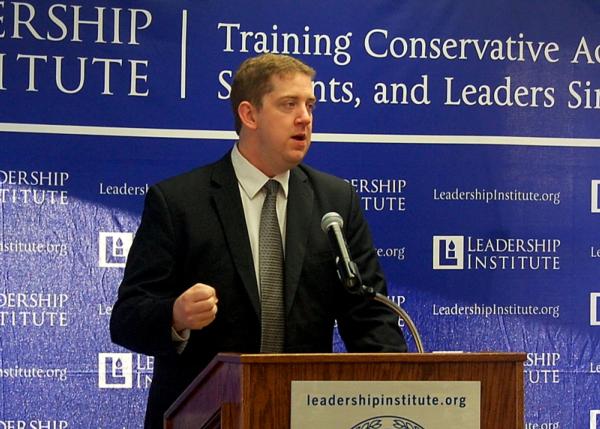
Carmela Martinez
February 7, 2013
Breakfast with a Side of Economics
Yesterday the Leadership Institute welcomed Art Carden, assistant professor of economics at Samford University in Birmingham, Alabama, and 129 others for LI's monthly Wednesday Wake-Up Club Breakfast.Watch his full speech here.Dr. Carden is a strong advocate for free markets and economic liberty. In addition to his professor duties, he is a senior research fellow with the Institute for Faith, Work and Economics, a research fellow with the Independent Institute, and a regular contributor to Forbes.com."Redistribution doesn't solve poverty; it's economic freedom that solves poverty in the world,” he shared yesterday. "When we redistribute land from private owners to government, we are lowering economic growth in the long run."Americans have a right to the income they earn, Dr. Carden said. And when people are over-taxed, it reduces their incentive to work and in essence the government is making the world poorer, he argued.Dr. Carden has written papers on economic development, southern economic history, and Walmart.He argued that immigrating to the United States should be easier. Immigrants help grow the economy because they bring skills to America; they do not take jobs away from Americans."We need open and competitive markets. The Institute for Justice argues that one in three people need a government license to engage in their chosen profession -- this is absurd."Dr. Carden made arguments against the minimum wage, saying that it creates unintended consequences such as unemployment in the long run and enables the “rent-seeking society” – those that are directly pick-pocketing other people's pockets.He closed by stating that we need to think hard about where we have come from, where we currently are, and where we're going. Should we be focused on questions of redistribution or economic growth, and how do we recapture property rights and a competitive market?Please join LI at March's Wake-Up Club Breakfast on March 6. Sign up here. >
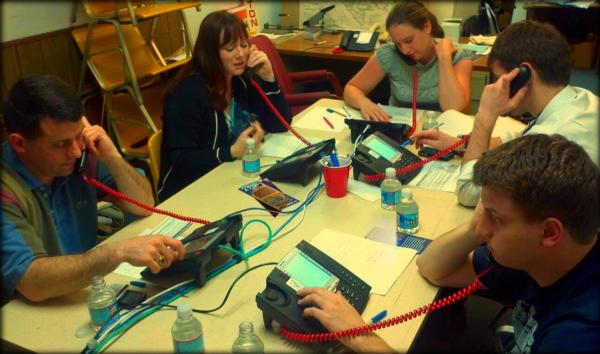
Heather Homan
January 18, 2013
Want to Win Your Campaign? Learn How to Recruit Your Volunteers
A common misconception is to keep recruiting until you have enough volunteers. The problem is if you are running an effective campaign you never have enough volunteers. Let's face it --life happens. People will cancel and bail on you at the last minute. Unforeseen tasks come up and in the campaign world you need to learn to expect the unexpected; what can go wrong, often does.In order to save you the often avoidable stress and wasted time of having to scramble at the last minute to find enough people to accomplish your goal, make sure you never run out of volunteers with these quick tips.* Have something for them to do. If you aren't prepared with projects for your volunteers, you will appear unorganized and it will reflect poorly on your campaign or organization. Without work, volunteers will get bored and go home and may never come back.*Treat them well. Remember, your volunteers are giving up their time – and we all know time is money. Make sure you feed them and thank them for sacrificing their time. Treating volunteers with respect may seem like a given, but you'd be surprised to know how many instances I've seen where this isn't always the case.*Never stop recruiting. Recruitment is a fulltime job – it never ends. You should always be searching for new volunteers and encouraging folks to sign up to volunteer for your candidate or cause. You need to be bold and ask people to volunteer; they aren't going to be knocking at your door, so you need to find them. If you have 30 phones to fill, don't recruit 30 volunteers and think you've succeeded. Keep recruiting and constantly look for ways to bring new people on board.Give ‘em a title and get ‘em involved. There is always something to be done. If you don't have work for volunteers to do, then you need to reevaluate your campaign! Recruitment doesn't have to be a tedious task. In fact, it can be an effective tool to mobilize supporters to your campaign or cause. Volunteers are your biggest asset -- now go recruit!This article is a part of a regular “Expert Insights” series which delves into the mechanics of political technology. LI staff, faculty, graduates, and conservative friends are welcome to submit an article by contacting Lauren Day at Lauren@LeadershipInstitute.orgHeather Homan is the Leadership Institute's political training coordinator and manages LI's week-long Campaign Management Schools and Future Candidate Schools. Before coming to LI she worked five years for U.S. Senator George V. Voinovich (R-OH) in his state office and later on Capitol Hill. She currently is the national committeewoman for the Young Republican Federation of Virginia, where she also serves as chair of the YRFV's outreach committee. Locally, Heather serves as the membership chair for the Arlington Falls Church Young Republicans. Heather is a 2005 graduate of The University of Toledo, where she received a B.S. in Criminal Justice and also holds a Master's in Organization Development from Bowling Green State University's College of Business. >

Carol Wehe
January 4, 2013
Making New Year Resolutions!
We were talking about New Year's resolutions in the office today, and aside from the regular ‘get in shape' resolutions, I heard a couple of great ideas. To help you think up a good list of resolutions, and then make it easy to keep them, I'll share a few ideas with you.* Become a great public speaker – For public speaking skills, practice is key. But, practice doesn't make perfect. You can just end up cementing bad habits and embarrassing yourself. So, start by learning from public speaking experts at the Leadership Institute's Public Speaking Workshop.*Change your community – Do you want to make a difference in your community, but don't know where to start or how to be effective? Go to the Leadership Institute's Youth Leadership School and Political Activism Trainings in your area to learn techniques from seasoned activists. *Be more tech savvy – The internet and smart phones are taking over our everyday lives. Learn to harness technology to make your voice heard online at LI's Online Activism and Strategy Trainings.*Run for local office – Sounds scary, huh? See if running for office is for you and learn how to be an effective candidate at the Leadership Institute's Future Candidate School. Learn from the experts – former candidates and consultants.*Pay the rent – You can't save the world if you can't pay the rent. Excel at raising funds in your current position, or get a job raising money for conservative orgs or campaigns. Learn how to effectively raise money at LI's Comprehensive Fundraising Training.Hope you enjoyed the holidays, and good luck with your 2013 New Year's resolutions! >
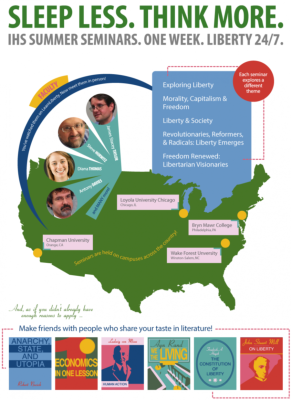
Lauren Day
January 3, 2013
Apply Now for IHS Summer Seminars
This summer, the Institute for Humane Studies will offer nine college-level seminars on the foundations and future of freedom.Participants from around the world will explore market-based solutions to widespread problems, challenge status-quo academic thinking, and learn about ways to stand for freedom through a variety of career paths.Students and recent graduates are eligible.Learn more: www.TheIHS.org/summer-seminars.Students who apply by March 1 are eligible to receive a free book! >
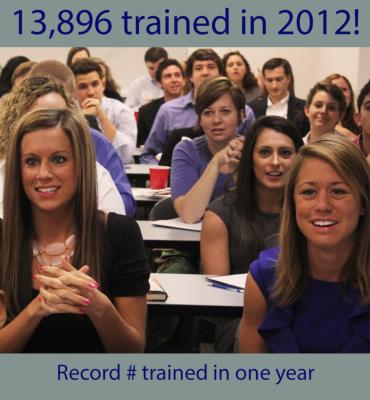
Lauren Day
January 2, 2013
LI's 2012 In Review
This past year—2012—was record-breaking for the Leadership Institute. LI's staff and 349 volunteer faculty trained 13,896 conservatives—the most ever in any year of the Institute's 33-year history—bringing the total trained to 116,800 since its 1979 founding. LI hosted 359 trainings in more than 30 states and 13 countries.Twelve stories on LI's CampusReform.org made national news, making the site America's #1 source for campus news online with more than 2 million unique hits. LI's 25 field representatives helped conservative students start 269 new independent student groups into LI's unique network of 1,511 student groups on 616 college campuses, the largest such network in the nation. LI's Career Services Center hosted 985 attendees at job fairs, offered 120 hours of personal career mentoring, and placed 104 conservatives in jobs. LI's 37 interns came from 33 colleges, 19 states, 6 countries, and spent 3,429 hours combined in LI training. It's been a good year at the Leadership Institute, and we are excited about what 2013 has in store!How has LI helped you on your professional journey? Email Lauren@LeadershipInstitute.org to share your story. We are always looking to spotlight notable graduates of LI programs. >

Lauren (Hart) Day
December 6, 2012
The Fraud of “Hope” and “Change”
The Leadership Institute welcomed Kate Obenshain, writer, speaker, and frequent Fox News guest, to its monthly Wednesday Wake-Up Club Breakfast. More than 90 conservatives came early Wednesday morning to hear her discuss Divider-In-Chief, her latest book, and how President Obama has deceived Americans with his hope and change rhetoric.Kate specifically focused her speech on young Americans and how the Obama administration has affected them.As she wrote in her book, “Barack Obama has played young people. He reached out to them with soaring speeches championing unity, and they responded to his call to transcend differences and engage in a new kind of politics. In fact, they responded with more enthusiasm, more genuine hope than any other demographic. And the president repaid their trust with betrayal—becoming not the great united, but the most divisive president in history. He has robbed them of current and future prosperity, perverted their understanding of the value of hard work, ambition, and the American dream, and poisoned their optimism—the very optimism he used to soar to victory in 2008.”Kate has held many distinguished posts from being the first woman chairman of the Republican Party of Virginia to an appointee for Governors Allen and Gilmore on the State Council of Higher Education to chief of staff to Senator George Allen and serving as vice president of Young America's Foundation. She has four children and is a regular on Fox News and in other media.After Kate's talk, attendees had the opportunity to buy her latest book, Divider-In-Chief: The Fraud of Hope and Change, in person and receive an autographed note.To listen and watch her full remarks Wednesday, please click here for the video. >

Kate Miller
October 18, 2012
In Front of TV Cameras
Know what you want to say. Say it in a simple manner. Look and sound the part.These were basic principles of the last Friday's Introduction to Television Techniques Workshop taught by Beverly Hallberg at the Leadership Institute.The 16 students learned to effectively communicate via broadcast media: what to wear, how to present themselves, and the type of language to use. Many students came away with the same observation: it's the little things that make a difference.Nicole Hudgens, an intern with the Young Leaders Program at The Heritage Foundation, remarked, “I've had a lot of communication classes since it's what I got my degree in, but this covered some things I had not heard before and I really enjoyed it! Beverly gave great practical advice and I'd love to go to another workshop.”In general, keep it snappy. TV and radio are made for soundbites, not lectures. Viewers listening to a dialogue will stay far more engaged than those listening to a monologue. Plus, you're more likely to be invited back when the host feels like they control the conversation.Live interviews are the easiest to control. Whatever is said airs—not the case with recorded interviews. When recorded, your comments are at the mercy of the segment's producer: important statements might get cut because you gave them too much material. For a pre-recorded interview, make sure comments are prepared in advanced. The rules change entirely; you have no control over what is aired, but you are in complete control of your answers. Questions are not typically broadcast, so answering the question is non-essential.Regardless of the type of interview, Beverly cautioned, “Anticipate what you will be asked. Prepare your ammo correctly.”It's essential to practice and prepare statements; even the most knowledgeable person can forget their main points when asked an unexpected question.After receiving these tips (and many more—register for LI's TV training here for all of them), attendees practiced their skills on the camera.Beverly went through and critiqued each person's performance. Everyone stepped in front of the camera for a second time, and each person's improvement was dramatic.Those who were long-winded initially became succinct. The quiet people became more assertive and appeared confident. Everyone was empowered to be an effective communicator for their chosen topic. Megan Moore, an intern at the Leadership Institute's ConservativeJobs.com, observed, “It was incredible to see how quickly everyone improved. Most of us were not engaging the first time. In ‘take two,' we were all persuasive and followed Beverly's rules.”If you want to learn and practice what it takes to be an effective on-camera spokesperson, register for our next Television Workshops on December 14. Or, register for one of LI's other upcoming trainings here. >